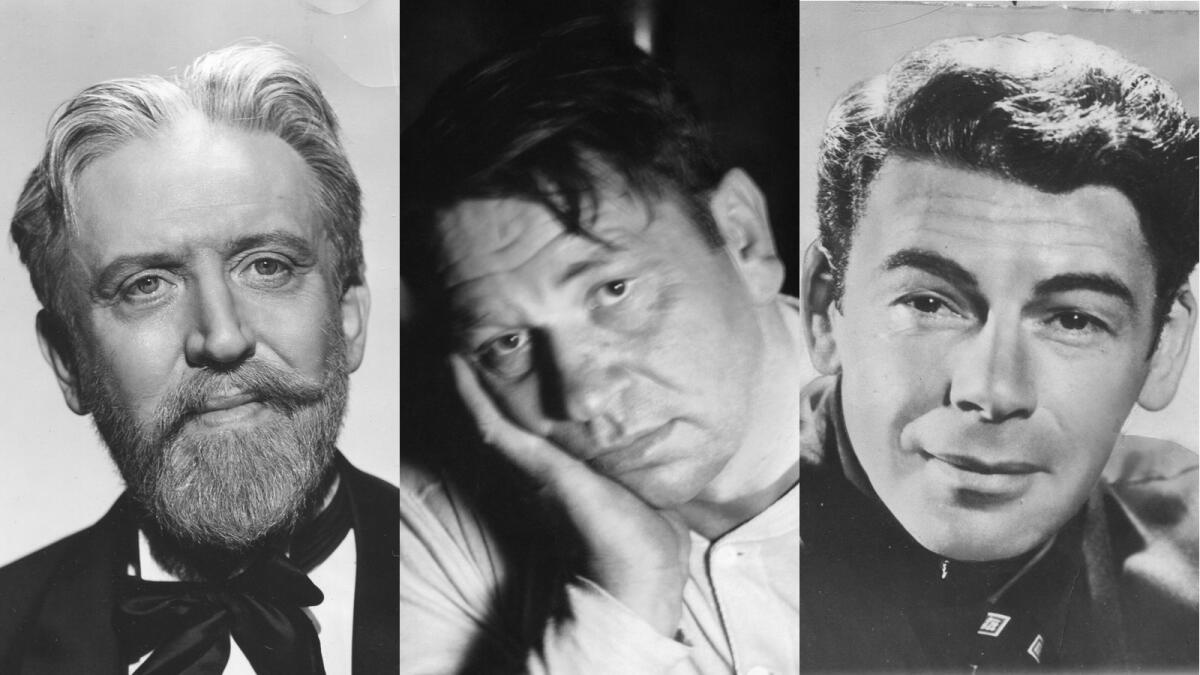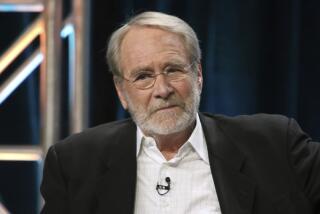From the Archives: Monty Woolley’s success means breaks for character actors
- Share via
This is the first in a series remembering the Los Angeles Times’ 100-plus years of covering Hollywood.
Seventy-five years ago this week, longtime Times drama critic Edwin Schallert pondered the future for veteran character actors as younger performers went off to war.
Monty Woolley (1888-1963) had recently become an unlikely movie star playing the acid-tongued critic Sheridan Whiteside in the 1942 comedy “The Man Who Came to Dinner” after starring in the stage version. Famously resistant to part with his luxuriant facial hair, Woolley once said, “Take the beards away from Santa Claus and Bluebeard and what do you have? — nothing but a pair of middle-aged, overstuffed bores.”
Here’s Schallert’s take on Woolley and the fate of character actors, which was published Jan. 10, 1943.
-------------
Monty Woolley has fixed the star of hope in the cinema sky anew for the character actor, but the road to stellar success for these mature types is never easy.
Most of them have come to the films full-fledged, usually with benefits of enormous stage success. What’s more, they often have to return to Broadway to renew their prestige.
Among few striking exceptions through the years is Wallace Beery, born and bred of the movies, who found his way out of supporting parts a long time ago to the areas of glitter.
The actual turn in the road for Wally was “Robin Hood,” which gave him the chance to star in “Richard, the Lion-Hearted” and it wasn’t long thereafter until being top-spotted in pictures became routine. To be sure, he was much helped by being teamed with Raymond Hatton in a series of service features, just as Victor McLaglen gained greatly by costarring with Edmund Lowe. Later, of course, he, too, attained solo stardom.

Few find fortune
But there have been scarcely any like them in consistency who have come by the picture route, whereas at least a fair number have enjoyed bright fortune because they had footlight triumphs to their credit. Paul Muni, for one, needed the blending of film and stage conquests to insure his remarkable reign. Lionel Barrymore, who had a splendid theatrical record in his time, on several occasions has had to fight his way back to prestige. Adolphe Menjou needs a fresh start every once in a while, though he is essentially cinematic.
All this is indicative of one fact, namely that Hollywood will sell a character actor down the scale rather than up if it can. A plain reason exists. It is more difficult to find a proper vehicle for such a player, whereas it is easy to obtain dozens of the boy-meet-girl scripts fitted to young stars who are getting a studio build-up.
Woolley has helped the whole deal measurably because he has turned executives’ thoughts toward pictures that might be suitable for the seasoned actor. He has set a new pace for these players, and moreover, his arrival is of enormous benefit to the studios, for they will have to begin to think more and more of replacing the youthful stars with the mature actors. The war is demanding that change of viewpoint.
Joslyn let down
Apropos of all this, it is a pity that the build-up for Allyn Joslyn seems to lag. He registered so brilliantly in “The Wife Takes a Flyer” that it seemed the organizations would think of him for peak-featured roles.
I have seen him in but one picture since then and the impression was purely negative. The part of a book agent to which he has been assigned in “Faculty Row” doesn’t sound especially lustrous. But then Ernst Lubitsch is shortly taking him in tow. That may help.
Joslyn’s experience to a degree resembles Woolley’s. He was out here previously with naught auspicious happening, went to the stage for a term, came out again and renewed his career with vigor. If he doesn’t enjoy the fullest benefits of that bright start he’ll probably have to go back to Broadway again.
On his previous visit Woolley’s initial assignments in pictures were his best. Then the old decay, studio-engendered, set in. It wasn’t long before the compass pointed toward New York and Woolley was offered that brilliant “break” in “The Man Who Came to Dinner.”
Hollywood had to take notice but it’s worth remembering that various other actors were considered for the part of Whiteside in the picture version before Woolley finally was selected. If there’d been a chance to find a substitute it’s a cinch that substitute would have been selected — or am I being cynical?
Boris Karloff hit the trail opportunely to the bright-light district some months ago, and the long run of “Arsenic and Old Lace” naturally spells an upping of his prestige.
Everything is working in his favor therefore from an exploitation standpoint and it is the moment for Karloff to extract from the movies more grateful and gratifying opportunities. It has been proved by now that enacting the monster in “Frankenstein” is largely a matter of make-up that may be assumed by anybody of proper stature. Doubtless Karloff was the best chosen for the impersonation, but it is nothing to stimulate his sway over film nabobs.
“Arsenic and Old Lace” is, perhaps, a far enough departure to give a new fillip to his Hollywood outlook. Whether it really helped or not in defining the part he is to act in the movies, the play paved the way for Erich Von Stroheim’s return, he having been picked to portray Gen. Rommel in “Five Graves to Cairo.”
SIGN UP for the free Classic Hollywood newsletter »
Paul Muni is one of the actors who are in a transition phase. The stage beckons one month, the screen the next. It is a good balance for an actor to maintain until he is traveling the high road anew.
Possibly if Muni is brought out to interpret Victor Hugo that will signify new victories in the biographical feature, which is the kind of role that won him the bigger plaudits and even Academy recognition.
Every actor in this sphere who is brought into the spotlight now will make the problem of the studios easier during the wartime. When such stars are identified with pictures these generally achieve class and distinction. Fostering their activities, therefore, is lucrative in more than one way.
See the most-read stories in Entertainment this hour »
Movie Trailers
More to Read
Only good movies
Get the Indie Focus newsletter, Mark Olsen's weekly guide to the world of cinema.
You may occasionally receive promotional content from the Los Angeles Times.








